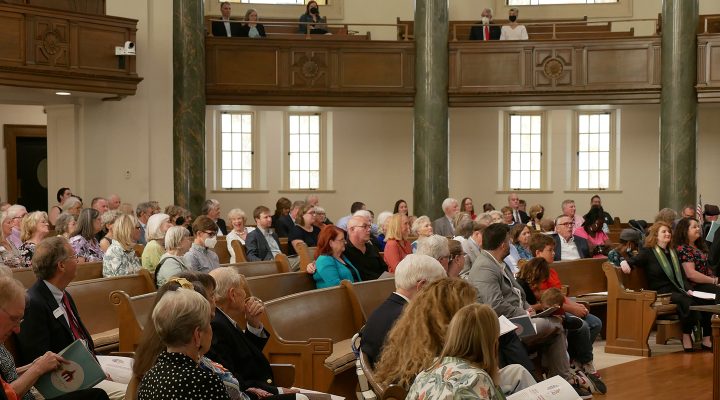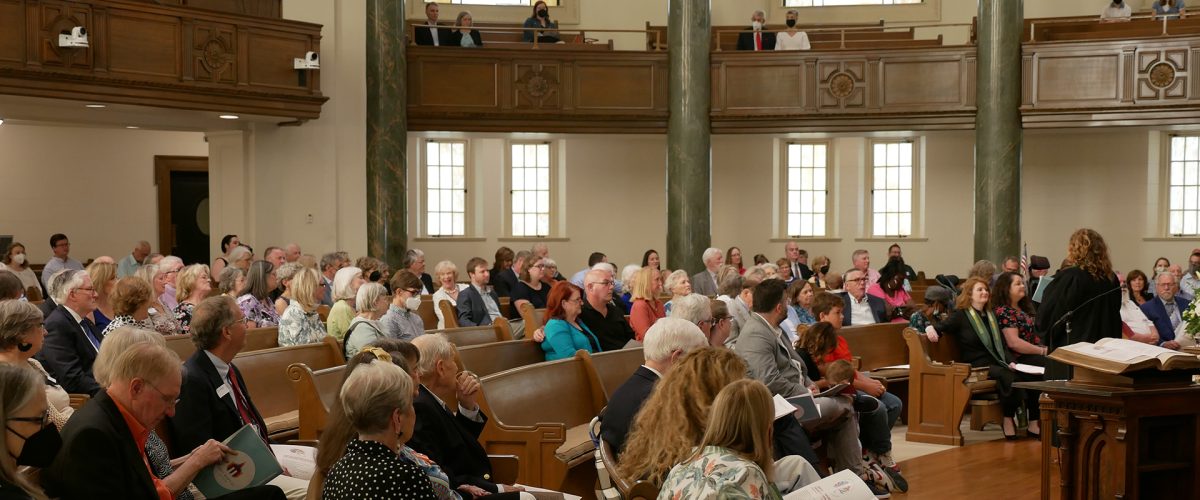Waiting an extra year because of COVID-19 to mark its 150th anniversary has not stopped First Baptist Church on Fifth from celebrating its history through continued ministry in Winston-Salem, N.C.
Nor has the church been resting on its laurels after finally being able to commemorate its Sept. 22, 1871, formation during a two-day observance last month. First Baptist knows no other way than to keep forging ahead, said Pastor Emily Hull McGee.
“If you came here today, you would see the spirit of this congregation in the gathering with one another for renewal and fellowship, and you would see and feel that energy being shared throughout the city.”
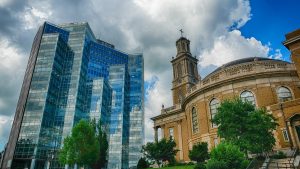
The historic sanctuary of First Baptist Church on Fifth, dating to 1924, stands in contrast to newer downtown buildings.
That spirit has defined the congregation from its beginning, when Alfred Holland moved to Winston, N.C., in 1871, and ran an advertisement in the local newspaper to find out if there were any other Baptists in the area. The ad, which ran in November 1870, read: “Are there any other Baptists in Winston? If so, they are invited to meet at my house on next Saturday night.”
At the time, only three thousand people lived in the combined communities of Salem and Winston.
Ministering to members and to the wider community through turbulent times is part of the history of the church long known as a champion of racial justice and social ministry.
“Randall Lolley, one of our former pastors, would use the phrase ‘gathered for worship and scattered for ministry.’ It’s encoded in the DNA of the congregation. We don’t just do church on Sunday. We go and live out our faith, our sense of Jesus’ call on our life in the world,” McGee said.
The many shapes that calling has taken in 150 years were memorialized during the Sept. 17-18 anniversary weekend.
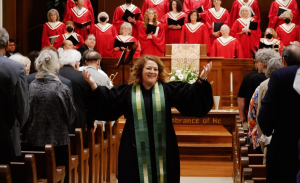
Emily Hull McGee blessing the congregation with a benediction
“People in our church have started many nonprofits in the community, including some that spun off to become stand-alone organizations such as Crisis Control, Habitat for Humanity, Samaritan Ministries, which is a shelter, and the Downtown Church Center, which provides clothing to those in need,” she said.
First Baptist also helped start other churches, including Knollwood Baptist Church, Salem Baptist Church and College Park Baptist Church.
“In 2001, a group of members formed Serving Our Savior, a ramp-building ministry that has provided ramps for nearly 1,500 families in Winston-Salem and continues to this day,” a church news release added. “In 2012, the church birthed a new nonprofit called the Winston-Salem Center for Education and the Arts.”
These and other projects have most often been initiated by lay members and can be traced back decades, said David Hughes, who served 23 years as pastor at First Baptist until McGee was called by the congregation in 2015.
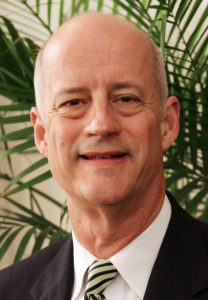
David Hughes
“In the early 2000s, we were approached about hosting an overflow emergency homeless shelter because the shelters were full going into winter,” he said. “We had taken in homeless folk in years past, so we said yes to that.”
But the move initially was blocked by city officials who demanded the church add a sprinkler system to its gymnasium along with other improvements to serve as an emergency shelter.
“The costs were prohibitive, but we didn’t give up,” Hughes explained. “We kept petitioning the state and the city to allow us to open. Eventually, the state relented.”
The church has innovated in many other ways through the years, including ordaining women for ministry in the 1970s and being an early congregation supporting the Cooperative Baptist Fellowship, joining the group in 1993 and blessing Hughes as he served as the first moderator of CBF North Carolina.
“Thankfully, the church had a history of innovation and a willingness to try new things,” he said.
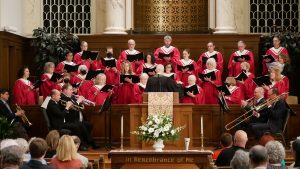
The choir at First Baptist Church on Fifth in Winston-Salem.
The ethos of innovation and willingness, as it is known and felt today, can be traced to at least the mid-20th century, McGee said. “The church began to live into its identity of scattering into the community in the ’50s and ’60s with a calling to social justice and to meeting needs of those around us.”
That identity surprised lifelong Baptist Paul McCraw, who was a student at Wake Forest University when he first visited First Baptist in late 1962.
“I was a freshman, and I was developing a wider understanding of religion and faith. So, I moved to downtown Winston-Salem and thought I would become something other than Baptist.”
That search included visits to five mainline congregations, but it was First Baptist and Lolley, the church’s brand-new pastor at the time, that made the most significant impressions.
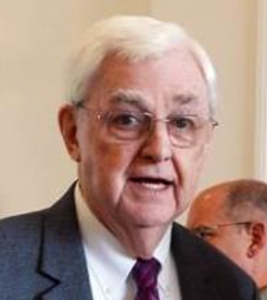
Paul McCraw
“They were different kinds of Baptists, and the mission of the church was quite different. They were following the teachings of Jesus in a different way than I was used to. Lolley was avant garde, and it was a church that did ministry in a way that not many churches were doing at that time.”
McCraw, one of the congregation’s historians, said he subsequently ceased searching for another denominational home and joined the church in early 1963. “I realized that, deep down, I was a Baptist.”
First Baptist’s members continue to live into the church’s spirit of innovation and compassionate ministry through involvement with Meals on Wheels, school PTA groups, Habitat for Humanity and other community nonprofits, McGee said.
The congregation recently has partnered with a nearby Section 8 housing facility to contribute to the well-being of its senior and disabled residents and is collaborating with an elementary school to provide tutoring services to students. The church also is helping with the resettlement of an Afghan refugee family.
“Our church is located in heart of city, so we do ministry out our front door and our back door.”
“Our church is located in the heart of city, so we do ministry out our front door and our back door,” the pastor said.
And just in time for the 150th anniversary milestone, the church affirmed a new Confession of Identity. “It took us 14 months meeting over Zoom because of the pandemic, but hundreds of hands were involved in writing it,” McGee said.
The document confirms the church’s expanding commitment to teaching, learning, helping children and mitigating poverty. “These callings have prompted our deepening work for racial justice, our embrace of LGBTQ individuals and families, and our commitment to equity and inclusion for all people,” the confession states.
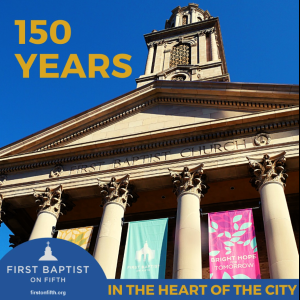 It also laments “that the witness of the church in our own time is divided and confusing, often betraying the very heart of God, the life-giving way of Jesus, and the liberating movement of the Spirit. Christ’s love compels us to confess the Christian church’s complicity in exclusion and division, and at times we have been negligent, indifferent, and silent in the face of injustice.”
It also laments “that the witness of the church in our own time is divided and confusing, often betraying the very heart of God, the life-giving way of Jesus, and the liberating movement of the Spirit. Christ’s love compels us to confess the Christian church’s complicity in exclusion and division, and at times we have been negligent, indifferent, and silent in the face of injustice.”
McGee said the confession is a guide to the congregation as it moves through a chaotic and ever-shifting world. “It enables us to say, very directly and publicly, the kind of Baptist church we are. It allows us to say what it means to be a community of faith in the heart of a city.”
Celebrating 150 years had a similar effect, she added.
“Looking back helps us see how our history is connected to the truth that at the heart of our Christian story is the act of remembering. We are a remembering people. We look back to the life of Jesus and God’s movement throughout history so that when we gather at the table, we do this in remembrance of him.”
Related articles:
Historic CBF church calls woman as pastor
CBF elects Georgia pastor Paul Baxley as executive coordinator

